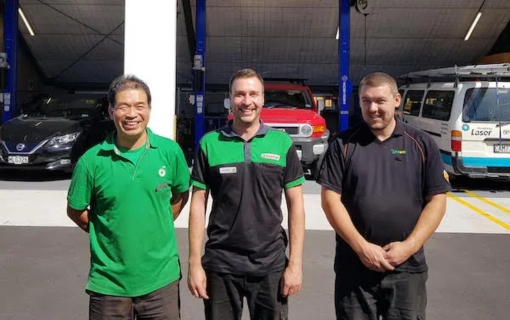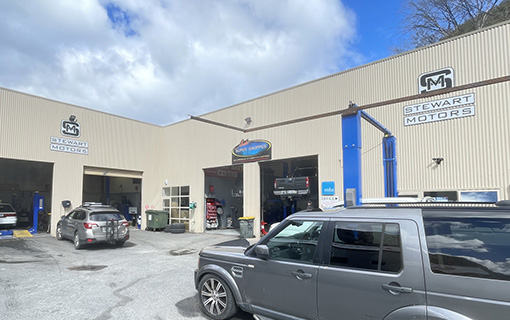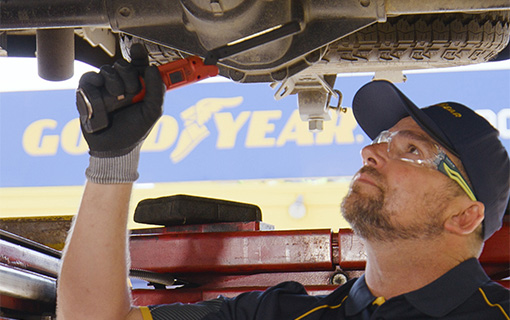For 25 years Shayn Rouse’ motobike shop has gone form strength to strength. Read on to find out how this rural Hikurangi motorbike dealership has utilised Orion software to build a sustainable business.
“I think the cost now is quite irrelevant, it’s not looking at the cost it’s looking at what it can do for you.”
How did you get into the business?
“I’ve had a love for motorbikes since I was a kid. I didn’t enjoy school so I was very lucky that my first job at 15 was my dream job in a motorcycle shop. Things have just gone from there.
When I got to 20 I went out on my own, and I’ve made a lot of mistakes and learnt a lot. I started the business from scratch, was staying up until 3am doing work. Started working out of a garage, then the business grew and grew.
Since then I’ve had to hire staff and we’ve branched out to parts, sales and brought in different franchises. The best thing is I’ve had my fingers in all the pies and know how it all works.”
Why did you start the search for a dealer management system?
“I never knew how much money we had in the bank or whether or not we could pay bills at the end of the month because it wasn’t a live system. I was struggling to pay suppliers.
We originally had a program that was a home and office software, we got it for something like $90 at the computer shop. It had everything we needed to get started. Eventually, our accountant suggested we look at something different.
The Orion rep had been into the shop a few times over the years, but I couldn’t see the value of it in front of my nose because of the cost factor. I think the cost now is quite irrelevant, it’s not looking at the cost it’s looking at what it can do for you.
Then I spoke to a few friends in the industry, they all backed Orion as the tool for the job.”
How has Orion helped your business grow?
I found we were undercharging jobs by about 40%
“We started using time-clocking and job cards straight away. We were really busy doing busywork, not doing chargeable work. Everything was done on a piece of paper at the end of the day and you’ve forgotten by then exactly how long you’ve spent on the job. We tightened that up and we’ve plugged one of the biggest holes in the business. I would say that previously we were undercharging jobs by about 40%.
I set goals for the team to give them a rough idea of how long jobs should take. It’s more effective and efficient. I then put out a report each month and the mechanics get to see it and that gives them an idea of where they’re going and what they’re achieving.
It’s worth its weight in gold. It tightens things up and brings mechanics on board, they can’t cheat the system. They can’t change what they think the job should cost.”
We’re not over or under stocking parts
“The stock management plugged a lot of holes for us, we were running on guestimation. I didn’t know if I was running too much stock or not enough. If stock levels were too high and it wasn’t getting sold, then I was wasting money. If they were too low and I didn’t have the parts in stock then I might lose a sale. We’re fairly isolated, so, when a customer needs something it can take a while. It keeps customers happy if we’ve got stuff in stock when they come.”
We’ve stopped doing busy work in the workshop
“I hate typing. I try to keep things as simple as possible. We’ve cut this down by using templates on job cards, you just tick the right boxes and that creates the job card
Job cards meant that I was able to create templates and have the cards ready to go for the start of the job, and any typing or extra notes on the jobs are now for the important extra things. Now additional notes are much more detailed because that’s all they have to type onto the job cards.”
It’s easier to communicate with customers
“We utilise the end-of-warranty to prompt a free check over before the end of the warranty and then we also have 5-month reminders for farm bikes. There’s definitely a difference with using text messages over phone calls for these reminders. People reply to these follow-ups, we used to ring people and you couldn’t get through, wouldn’t work.
For us, follow-ups are about securing work in your diary for the next month, you always know that there’s something in there and coming in.
We can book stuff into the shop better because we know what’s coming in, what time it should take and can order in parts in advance.”
Feedback from customers that “they listen”
“Prospecting is a big thing that we use. A lot of our business comes from the farm bike shop, when they come in they come for spare parts and if someone is coming for sales, then the team enter it in and our sales team get it. [We can keep note of what they were after and if we didn’t have it stock then, we can call them when it is in stock].
End of the day it’s about communication and service, it leaves customers thinking “they listen””.
I’ve got full insight into sales and margins
“I’ve now got more time to work on reports so I’m trying to understand them more and get everyone else to understand them more.
I share the reports with staff to make them aware of what we’re trying to do and how margins affect the business. The goal is transparency of where we’re making money. We’re trying to change the impression that every dollar ends up in my bank account, only a portion of it does and that comes down to margins.”



